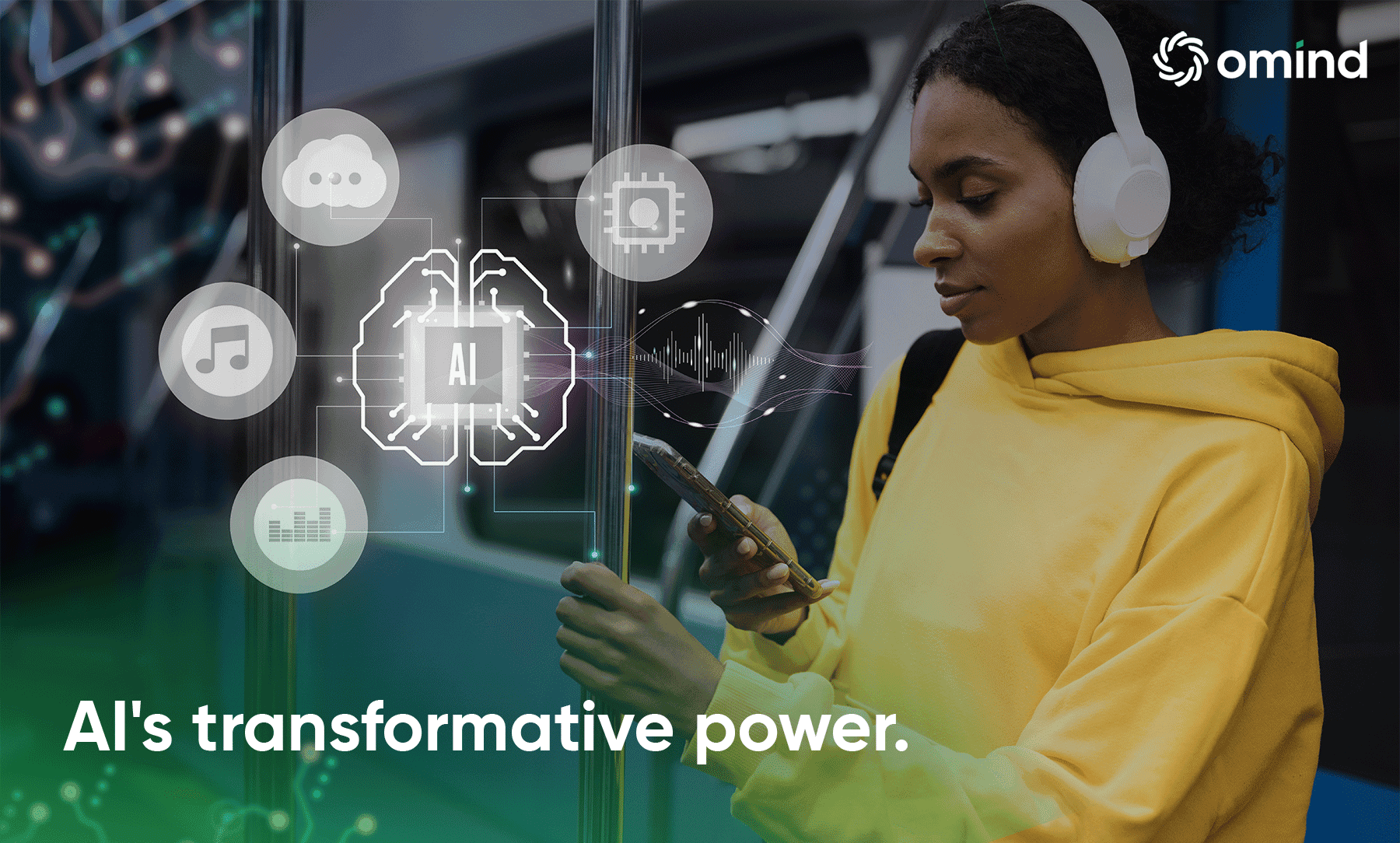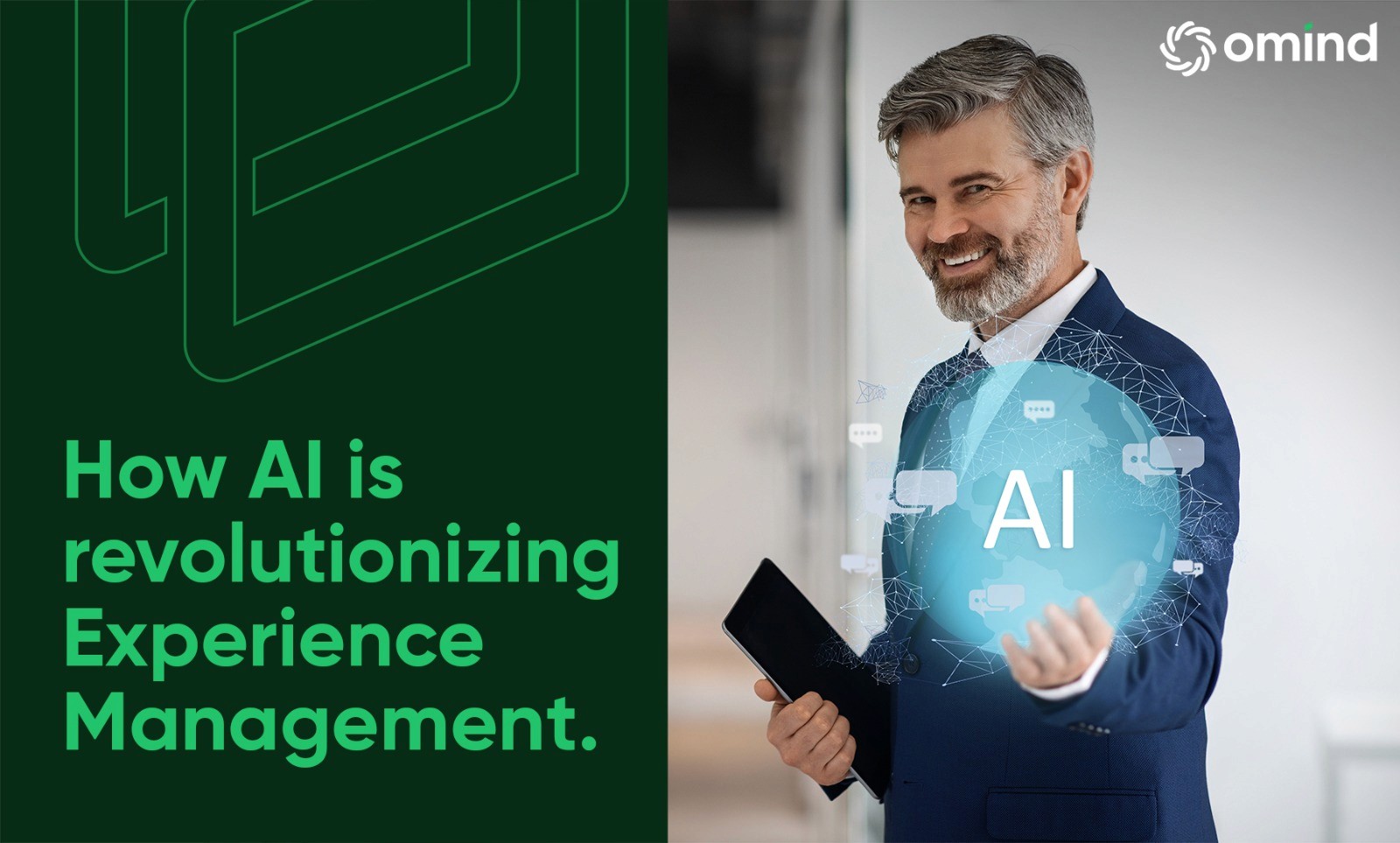Introduction
In the digital age, experience management is crucial for business success. It involves orchestrating all interactions between a business and its customers across various touchpoints to boost satisfaction, loyalty, and growth. However, maintaining consistently positive experiences is challenging as customer expectations rise and interaction channels multiply.
Enter Artificial Intelligence (AI)—a transformative force poised to revolutionize the way businesses understand, interact with, and deliver value to their customers. AI's capacity to analyze extensive data, learn from interactions, and forecast customer needs has made it indispensable in experience management. It goes beyond automating responses or streamlining operations; AI is reshaping personalized service paradigms, creating seamless, efficient experiences tailored to individual customer preferences and behaviors.
The move to AI-driven experience management is not just a future idea but a current reality. Businesses in various sectors use AI to understand customer behavior, automate tasks, and create engaging, personalized interactions. AI applications, from 24/7 chatbots to personalized shopping recommendations, are diverse and impactful.
In exploring AI's impact on experience management, we'll discover how it enhances customer experiences, the technology behind it, and the benefits it brings to businesses.
Understanding AI and Its Role in Experience Management

AI sits at the crossroads of technology and human experience, bridging complex data patterns with actionable insights. It includes machine learning, natural language processing, and robotics, mimicking human intelligence. AI's capabilities range from simple automation to complex decision-making, improving operational efficiency and customer engagement.
The Evolution of AI in Business
AI has evolved from an academic curiosity to a business essential, with significant milestones along the way. Initially used for automating routine tasks, AI now focuses on working smarter, not just faster or cheaper. It can analyze customer data, predict trends, and even understand human emotions, enabling businesses to offer personalized experiences at scale.
AI in Experience Management: A Paradigm Shift
AI has revolutionized experience management, which used to rely on human intuition and manual analysis. AI processes and analyzes data at unprecedented scales, impacting every part of the customer journey. It predicts customer preferences from the start and tailors interactions, and even offers instant assistance post-purchase through chatbots and virtual assistants.
AI's predictive analytics capabilities enable businesses to anticipate customer needs, often before the customers themselves are aware of them. This proactive approach to customer service not only enhances satisfaction but also builds deeper loyalty by demonstrating a commitment to customer well-being.
Moreover, AI contributes to experience management by enabling personalization at an individual level. Through the analysis of vast datasets, AI identifies patterns and preferences unique to each customer, allowing businesses to customize their offerings and communications.
Transforming Customer Interactions
One of the most visible impacts of AI in experience management is the transformation of customer interactions. AI-powered chatbots and virtual assistants have become the new front line of customer service, available 24/7 to answer queries, resolve issues, and guide customers through their journey. These AI tools learn from each interaction, continuously improving their ability to serve customers effectively.
Beyond customer service, AI enhances the overall customer experience by integrating seamlessly with IoT devices, social media platforms, and other digital touchpoints. This integration ensures a cohesive and consistent experience across all channels, tailored to the preferences and behaviors of the individual.
Transformation through AI Applications

The transformative power of Artificial Intelligence (AI) in experience management is best illustrated through its diverse applications. Each application not only showcases AI's versatility but also its potential to redefine how businesses interact with their customers. Let's explore several key areas where AI is making a significant impact.
AI-Powered Chatbots and Virtual Assistants
AI-powered chatbots and virtual assistants are revolutionizing customer service in experience management. They offer immediate, round-the-clock support, unlike humans, handling countless queries simultaneously. These AI systems learn from each interaction, improving their ability to understand and solve complex issues over time. This cycle of continuous improvement boosts customer satisfaction and allows human agents to focus on more nuanced problems.
Read More: Implementing AI-Driven Chatbots: Best Practices and Challenges
Personalized Marketing and Recommendations
AI is excellent at analyzing data to identify patterns and preferences, making it invaluable for personalized marketing. By analyzing customer behavior, purchase history, and social media activity, AI can tailor marketing messages and product recommendations to each individual. This level of personalization, once exclusive to luxury brands, is now accessible to businesses of all sizes thanks to AI. This not only boosts sales but also deepens the connection between businesses and customers.
Predictive Analytics for Proactive Experience Management
Predictive analytics, a standout AI application, anticipates customer needs by analyzing trends in data. Businesses use this insight to predict future behavior and tailor offerings. This proactive approach includes stocking in-demand products and offering personalized discounts to reduce churn. Predictive analytics keeps businesses ahead, delivering relevant, timely experiences.
AI-Driven Operational Efficiency
Beyond enhancing customer-facing services, AI applications significantly boost operational efficiency. Automated inventory management systems, predictive maintenance for equipment, and AI-optimized logistics routes are just a few examples. These applications not only reduce costs but also improve the quality of the customer experience by ensuring that products and services are delivered more reliably and efficiently.
Technology Innovation and Experience Management

The landscape of experience management is continually reshaped by technological innovations, particularly those driven by Artificial Intelligence (AI). These innovations not only enhance the capabilities of businesses to manage and improve customer experiences but also redefine what is possible in creating personalized, engaging, and efficient interactions.
Machine Learning Algorithms for Predictive Analytics
Machine learning, a subset of AI, has become a powerhouse for predictive analytics, enabling businesses to anticipate customer needs and preferences with remarkable accuracy. These algorithms analyze historical data and identify patterns to predict future behavior, from purchase decisions to potential customer service inquiries.
This foresight allows companies to tailor their strategies, ensuring that they meet customers' needs before they even arise. For instance, retail companies use machine learning to forecast trends, manage inventory more efficiently, and create personalized marketing strategies that resonate with individual customers.
Read More: How Machine Learning is Transforming the Customer Experience
Natural Language Processing (NLP) for Enhanced Communication
Natural Language Processing (NLP) technologies have significantly advanced, improving machines' understanding of human language. This progress has profound implications for experience management, particularly in customer service and content personalization. NLP enables chatbots and virtual assistants to understand and respond to customer queries more naturally and accurately, providing a more human-like interaction.
Furthermore, NLP is instrumental in sentiment analysis, allowing businesses to gauge customer emotions and sentiments towards products, services, or brands by analyzing social media posts, reviews, and feedback. This insight helps companies address concerns proactively and tailor communications to improve customer satisfaction.
AI-powered Recommendation Engines
Recommendation engines have evolved into sophisticated AI systems, offering highly personalized suggestions. They analyze past behavior, preferences, and real-time interactions to predict what customers might be interested in next. This enhances the shopping experience and drives sales for businesses. Streaming services, e-commerce platforms, and content providers use AI-powered recommendation engines to engage users effectively.
Augmented Reality (AR) and AI for Immersive Experiences
Augmented Reality (AR), powered by AI, is creating new dimensions in experience management by offering immersive and interactive customer experiences. Retailers are adopting AR to allow customers to virtually try on clothes, preview furniture in their homes, or experience a product before purchasing. This integration of AR with AI provides personalized recommendations within the immersive experience, significantly enhancing customer satisfaction and engagement.
The Future of AI in Experience Management
As AI technologies continue to evolve, the potential for further innovation in experience management is limitless. Emerging trends include the use of AI for real-time personalization, where experiences are tailored in the moment based on current customer data and interactions. Additionally, the integration of AI with Internet of Things (IoT) devices promises to offer even more personalized and context-aware experiences, from smart homes to connected cars.
The impact of these innovations extends beyond enhancing customer satisfaction; they also drive significant business value by improving efficiency, reducing costs, and fostering deeper customer loyalty. Companies that stay at the forefront of these technological advancements are likely to lead in the experience economy, setting new standards for customer engagement and business success.
Data Analytics and Personalization

In the realm of experience management, the synergy between data analytics and personalization forms the cornerstone of modern customer engagement strategies. Artificial Intelligence (AI) plays a pivotal role in harnessing this synergy, transforming raw data into actionable insights that drive personalized customer experiences. This section delves into how AI-powered data analytics is reshaping personalization and, by extension, redefining the standards for user engagement.
The Role of Data Analytics in Understanding Customer Behavior
Data analytics, powered by AI, enables businesses to sift through vast amounts of customer data—ranging from transaction histories and online interactions to social media activity and IoT device outputs. This comprehensive data analysis offers a 360-degree view of the customer, revealing insights into behaviors, preferences, and needs. By understanding these aspects, businesses can tailor their offerings and communications to resonate with individual customers, fostering a sense of value and relevance.
AI-driven analytics go beyond traditional analytics by not only analyzing past and present customer data but also predicting future behaviors. This predictive capability allows businesses to anticipate customer needs and preferences, offering personalized experiences that meet customers where they are likely to be. For example, predictive analytics can identify when a customer might be in the market for a new product or service, enabling businesses to proactively reach out with relevant offers.
Personalization at Scale
One of the most significant challenges businesses face in experience management is delivering personalization at scale. AI addresses this challenge head-on by automating the personalization process, enabling businesses to deliver customized experiences to hundreds, thousands, or even millions of customers simultaneously. This level of personalization was unthinkable a few decades ago but is now a reality thanks to advancements in AI technology.
Personalization, driven by AI, manifests in various forms—from personalized product recommendations and customized marketing messages to tailored website experiences and individualized customer service. Each interaction is informed by a deep understanding of the customer, ensuring that every touchpoint is an opportunity to enhance the customer relationship.
Enhancing User Engagement through Personalization
The ultimate goal of personalization is to engage users in a meaningful way, and AI-powered personalization achieves this by making every interaction relevant and valuable. Customers are more likely to engage with content, products, and services that reflect their interests and needs. This engagement is not merely transactional; it builds emotional connections, fostering loyalty and advocacy.
Personalized experiences also drive higher conversion rates and customer satisfaction. When customers feel understood and valued, they are more likely to make purchases, use services, and recommend the brand to others. Additionally, personalization can help reduce customer churn by identifying at-risk customers and engaging them with targeted interventions.
AI’s Impact on Business Efficiency and Experience Management

The integration of Artificial Intelligence (AI) into experience management extends beyond enhancing customer interactions; it significantly boosts business efficiency. This dual impact of AI—elevating customer experiences while streamlining operations—offers a competitive edge in today's fast-paced market. This section examines how AI fosters operational efficiency and its overarching effects on experience management.
Streamlining Operations with AI
AI technologies automate and optimize a wide range of business processes, from supply chain management to customer service. This automation reduces the time and resources spent on routine tasks, allowing staff to focus on more strategic activities that add value to the customer experience. For instance, AI-driven chatbots handle common customer inquiries efficiently, freeing human agents to tackle complex issues that require a personal touch.
Moreover, AI enhances decision-making through data-driven insights. Predictive analytics can forecast market trends, customer behaviors, and potential bottlenecks, enabling businesses to make informed decisions swiftly. This proactive approach minimizes risks and ensures that resources are allocated efficiently, contributing to smoother operations and better customer experiences.
Enhancing Productivity and Innovation
AI's role in improving business efficiency is not just about doing things faster but also about doing things smarter. By analyzing vast datasets, AI identifies opportunities for innovation, whether in product development, marketing strategies, or customer engagement techniques. This insight drives continuous improvement and innovation, ensuring that businesses remain competitive and responsive to changing customer needs.
AI also facilitates personalized training and development for employees, based on their learning behaviors and performance. This tailored approach enhances productivity and job satisfaction, further contributing to the overall efficiency of the organization.
Cost Reduction and Revenue Growth
The operational efficiencies gained through AI directly impact the bottom line. Automated processes reduce labor costs and minimize errors, while predictive maintenance can prevent costly downtime and extend the lifespan of equipment. Additionally, AI-driven personalization and customer engagement strategies can significantly increase conversion rates and customer lifetime value, driving revenue growth.
Businesses that leverage AI to improve efficiency often see a ripple effect, where enhanced operations lead to better customer experiences, which in turn drive loyalty and revenue. This virtuous cycle reinforces the value of integrating AI into both the operational and experiential aspects of business management.
Read More: How to Calculate and Boost the ROI of Customer Experience for Your Benefit
Takeaway
As we journey through the transformative landscape of experience management, powered by the relentless advancements in Artificial Intelligence (AI), it becomes increasingly clear that the future of business-customer relationships is being rewritten. AI, with its profound ability to analyze data, predict needs, and personalize interactions, has emerged not merely as a tool but as a visionary force driving the evolution of experience management.
From the seamless orchestration of customer interactions across multiple platforms to the creation of deeply personalized experiences that resonate with individual customers, AI stands at the helm, steering businesses towards unprecedented levels of engagement and efficiency. The exploration of AI's role in experience management reveals a dynamic interplay between technological innovation and human-centric service delivery.
Through the lens of AI-powered chatbots, predictive analytics, and personalized marketing, among other applications, we've witnessed the tangible benefits that AI brings to the table—enhanced customer satisfaction, increased operational efficiency, and, ultimately, business growth.
Moreover, the continuous evolution of AI technologies—ranging from machine learning algorithms and natural language processing to augmented reality—offers a glimpse into a future where experience management transcends traditional boundaries. In this future, real-time personalization and immersive experiences become the norm, further elevating the standard for customer engagement and setting new benchmarks for business success.
The integration of AI into experience management is not just a strategic imperative but a transformational journey that redefines the essence of customer interactions. As businesses navigate this journey, the insights and innovations driven by AI will undoubtedly serve as their compass, guiding them towards a horizon where customer experiences are not only managed but cherished.
If you're seeking more insights and assistance in enhancing your experience management strategies, explore Omind. Together, let's unlock the full potential of your experience management efforts, driving your business to new heights of success.
AUTHOR
Team Omind
Empowering Businesses with Unified Customer Experience Platform, Leveraging Advanced AI and Intelligent Automation
PRODUCT
AI
Share LINK
Related Blogs




